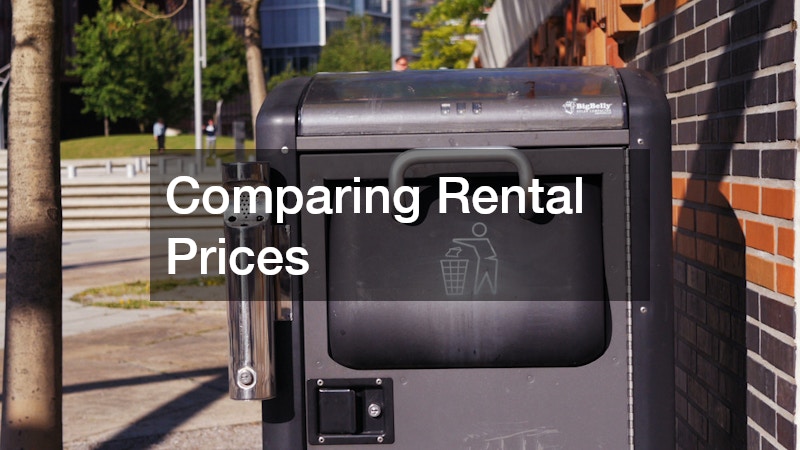Roll off dumpster rentals have become essential in modern home renovation and cleanout projects. These dumpsters serve as effective and efficient waste management solutions, critical in maintaining organized and safe project sites. The increasing popularity of home renovations and large-scale cleanouts has underscored the need for such services, emphasizing their role in sustainable and responsible waste disposal practices.
Understanding Dumpster Sizes
Choosing the right size dumpster is crucial in ensuring the project’s waste is managed efficiently. Roll off dumpsters come in various sizes, typically ranging from 10 to 40 cubic yards, catering to different project scales. Selecting the appropriate size should be based on the project’s scope, considering the type and volume of materials that will need disposal.
Smaller projects, like minor home cleanouts, might only need a 10- to 15-yard dumpster. Larger renovations, such as significant demolitions or whole-house cleanouts, often require 30- to 40-yard containers. Choosing the right size helps in avoiding the additional costs and logistical challenges of needing multiple hauls.
Estimating Waste Volume
Estimating the waste volume for your project is vital in determining the right dumpster size. A good starting point is to list all materials and items that will be discarded during the renovation or cleanout. Many rental companies provide online calculators or guidelines to help estimate waste volume based on project type.
For instance, remodeling a kitchen might generate both heavy debris, such as tiles and countertops, and lighter materials like drywall. Considering the density and makeup of each material can guide an accurate estimate of the waste to be removed. A rule of thumb is to always anticipate slightly more waste than initially expected, as most projects tend to exceed planned figures.
Consulting with Rental Services
Discussing your project with rental services can provide expert advice on choosing the right dumpster size. Rental companies have extensive experience and can offer insights based on previous similar projects. Communicating project specifics, such as size, type, and duration, allows these experts to make informed recommendations.
Many companies offer free consultations and estimates to architects and homeowners planning renovations. Leveraging these offerings can lead to a better understanding of the variety of dumpster sizes available. These consultations can clarify any doubts and help avoid costs associated with incorrect size selection.
Factors Influencing Rental Costs
Several factors influence the cost of renting a roll-off dumpster, each varying with the specific needs of your project. Generally, the primary considerations include the location of your project, the size of the dumpster, and rental duration. Additionally, the type of waste being disposed of can also significantly impact rental expenses.
Location plays a crucial role, as the accessibility of the site and local regulations may affect the pricing. The rental duration is another contributing factor, with longer terms typically incurring higher fees. Waste type is equally important, as certain materials may require special handling or disposal, increasing costs.
Comparing Rental Prices
To secure the best possible deal, it’s advisable to compare quotes from multiple dumpster rental providers. Variations in pricing can occur due to different service packages, included fees, or additional benefits offered by each company. Carefully reviewing these quotes helps identify the most cost-effective options without compromising service quality.
When comparing, make sure to clarify what is included in each quoted price. It’s essential to know whether delivery, pick-up, and any potential dump fees are incorporated. Many companies offer all-inclusive packages, which can be more economical and convenient than paying à la carte for different services.
Cost-Saving Tips
Implementing certain strategies can significantly reduce the overall cost of dumpster rentals. One useful tactic is to efficiently fill the dumpster, maximizing space through strategic stacking of items. Avoiding empty spaces not only conserves space but also minimizes the need for additional hauls.
Being mindful of weight limits is another way to prevent overage fees. Many companies charge extra fees if the weight limit is exceeded, so knowing these limits in advance is crucial. Sorting waste materials by weight and density before disposal can ensure compliance with weight restrictions.
Acceptable Materials
Roll off dumpsters are versatile and suitable for disposing of a wide range of typical renovation and cleanout materials. Generally, they accept standard debris such as wood, drywall, metals, bricks, and tiles. Additionally, household items like furniture, appliances, and certain types of yard waste can be disposed of responsibly using these dumpsters.
However, it’s advisable to check with your specific rental provider as permissible materials can vary. Before beginning your project, reviewing the list of accepted items ensures compliance and avoids potential fines. Proper separation of recyclable materials also enhances environmental responsibility beyond legal stipulations.
Proper Disposal Alternatives
For materials that cannot be placed in roll off dumpsters, alternative disposal methods are available. Recycling centers often accept materials like electronics, batteries, and metals. Properly recycling these items helps reduce landfill waste and recover valuable resources.
Roll off dumpster rentals play a pivotal role in ensuring clean and efficient waste management in home renovation and cleanout projects. Selecting the appropriate dumpster size, understanding rental costs, and adhering to accepted disposal practices significantly enhance project efficiency. These considerations not only maintain organized sites but also underline the importance of sustainable and responsible resource management. Embracing such protocol supports personal project goals while advancing wider environmental benefits.

